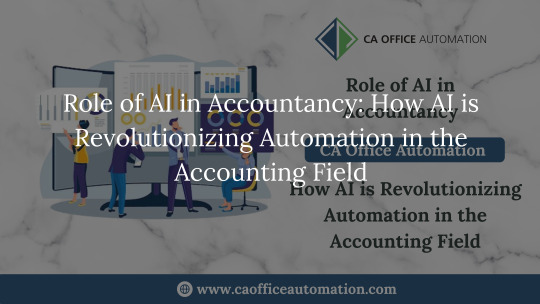#AccountingTech
Explore tagged Tumblr posts
Text
Staff Shortage: How I built a Custom GPT for Payroll | Future Proof Accountant
youtube
In this episode, Neha's sharing how a last-minute team crisis turned into an opportunity to think outside the box. With key staff away and payroll deadlines approaching, we build a custom GPT that could read PDF timesheets and photos to calculate hours for us! And this little AI tool saved us from disaster!
#PayrollSolutions#BookkeepersAU#AccountingTech#FutureproofAccountants#AussieBookkeepers#StaffShortageFix#CustomGPT#WorkflowAutomation#BookkeepingLife#EOFYReady#PracticeGrowth#ModernAccounting#Youtube
0 notes
Text
#AccountingSoftware#FintechDevelopment#BuildLikeXero#CustomSoftware#SoftwareDevelopment#FinanceApps#StartupSoftware#XeroAlternative#AccountingTech#SaaSDevelopment
0 notes
Text
Why CA Firm Should Switch to Cloud-Based Practice Management Software

🚀 Still stuck with offline practice management tools? It’s 2025, time to move your CA firm to the cloud! ☁️💼
If your team’s buried in spreadsheets, hopping between WhatsApp groups, or constantly chasing document approvals... you’re not managing your practice, you’re firefighting. 🔥🧯
Cloud-based Practice Management Software isn’t just a trend, it’s the backbone of modern CA firms. From streamlining workflows and tracking deadlines to centralizing client communication, everything becomes easier, faster, and more secure. 🔐📈
✅ Real-time collaboration
✅ Automated task reminders
✅ One dashboard for everything
✅ Access from anywhere, anytime
Whether you’re a solo practitioner or managing a growing firm, moving to cloud PMS gives you clarity, control, and peace of mind. ✨
💡 Think of it like this: Offline tools are the typewriters, and cloud PMS is your MacBook Pro. Why stay behind?
👉 Don’t let inefficiencies drag your firm down. Embrace the tech shift that’s already transforming top CA firms across India.
🔗 Read the full blog to know why switching to cloud PMS is not just a good idea, it’s essential for survival:
👉 https://www.suvit.io/post/switch-to-cloud-practice-management-software
#CAfirm#CloudPMS#PracticeManagement#AccountingTech#Suvit#Automation#FutureOfWork#CharteredAccountant#WorkSmarter
0 notes
Text
#FinanceAutomation#DigitalEscrow#AccountingTech#FinOps#BankingSolutions#FinancialInfrastructure#datanimbus
0 notes
Text

5 Features to Look for in an Invoice Management App
Tired of manual invoicing late payments and billing errors? Then it's time to upgrade to a smart invoice management app — but not all tools are created equal.
Here are 5 must-have features to look for:
Save time and eliminate errors by auto-generating professional invoices based on templates or pre-filled customer data.
Reduce late payments with automated reminders sent to clients before and after due dates.
Give clients the flexibility to pay via credit cards, UPI, net banking or digital wallets — all in one place.
Know when invoices are sent, viewed, and paid — so you stay in control at every stage.
Instantly view summaries, overdue lists and payment trends with built-in reporting dashboards.
Let your invoicing work for you — not the other way around.
#InvoiceManagement#InvoicingApp#Team365#SmartBilling#PaymentAutomation#InvoiceSolutions#BusinessFinance#GetPaidFaster#InvoicingFeatures#FinanceApps#SMBTools#InvoicingSoftware#BillingSolutions#AccountingTech#PaymentTracking#DigitalInvoicing#BusinessTools#InvoiceReports
0 notes
Text
#EInvoicing#DigitalInvoicing#ElectronicInvoicing#TaxCompliance#Paperlessoffice#BusinessEfficiency#DigitalTransformation#InvoiceProcessing#TechInnovation#Fintech#AccountingTech#DigitalBusiness
0 notes
Text
Generative AI is transforming corporate accounting by automating repetitive tasks and improving accuracy. From generating financial reports to analyzing large datasets, AI tools can help accounting teams work smarter, not harder. Imagine reducing the time spent on audits, enhancing fraud detection, and optimizing financial planning—all with AI-driven insights. These innovations allow accountants to focus on strategic decision-making rather than number-crunching. Ready to learn how generative AI can revolutionize your company's accounting processes?
🔗 Read more about the future of accounting with AI!
#GenerativeAI#AccountingTech#CorporateFinance#Automation#AIforBusiness#FutureOfAccounting#FinanceTransformation#DigitalAccounting#AIinFinance
0 notes
Text
Generative AI is revolutionizing corporate accounting by streamlining processes and improving accuracy. From automating routine data entry tasks to analyzing complex financial reports, AI reduces human error and frees up valuable time for accountants to focus on strategic tasks. Its ability to quickly process large volumes of data allows for more timely insights, aiding decision-making and compliance. Plus, AI-driven forecasting helps companies better prepare for the future, offering a competitive edge in the fast-paced corporate world.
Discover how generative AI is transforming corporate accounting. Read more
#AIinAccounting#CorporateAccounting#Automation#GenerativeAI#FutureOfFinance#AITransformation#AccountingTech#BusinessInnovation
0 notes
Text
Accounting vs. Bookkeeping in Income Tax: Differences and Similarities Explained
When it comes to bookkeeping and accounting for income tax purposes, there are some important differences that businesses should be aware of. For one, bookkeeping is primarily concerned with the recording of financial transactions, while accounting is more focused on the interpretation and analysis of those transactions. This means that bookkeepers are mainly responsible for ensuring that all financial transactions are accurately recorded in the company's books, while accountants are responsible for analyzing those transactions and providing advice on how best to manage the company's finances.
Another key difference between bookkeeping and accounting is that bookkeepers typically work on a per-transaction basis, while accountants typically work on a monthly or quarterly basis. This means that bookkeepers are usually paid for each transaction they record, while accountants are typically paid a salary or hourly rate.
So, what does all this mean for businesses when it comes to income tax? Well, first of all, it's important to understand that both bookkeepers and accountants can be invaluable when it comes to preparing and filing your company's income tax return. However, there are some key differences that you should be aware of.
For one, if you're primarily concerned with ensuring that all of your financial transactions are accurately recorded, then you'll want to focus on hiring a bookkeeper. On the other hand, if you're more interested in having someone who can provide advice on how best to manage your company's finances, then you'll want to focus on hiring an accountant.
Another key difference between bookkeeping and accounting when it comes to income tax is that bookkeepers typically work on a per-transaction basis, while accountants usually work on a monthly or quarterly basis. This means that bookkeepers will usually be paid for each transaction they record, while accountants will typically be paid a salary or hourly rate.
So, which option is right for your business? Ultimately, the decision comes down to your specific needs and preferences. If you're primarily concerned with ensuring that all of your financial transactions are accurately recorded, then you'll want to focus on hiring a bookkeeper. On the other hand, if you're more interested in having someone who can provide advice on how best to manage your company's finances, then you'll want to focus on hiring an accountant.
What is Accounting?
Accounting is the process of recording, classifying, and summarizing financial transactions to provide information that is useful in making business decisions. The accounting process involves identifying, measuring, and communicating economic information to permit informed judgments and decisions by users of the information.
The American Institute of Certified Public Accountants (AICPA) defines accounting as "the art of recording, classifying, and summarizing in a significant manner and in terms of money, transactions and events which are, in part at least, of a financial character, and interpreting the results thereof."
The accounting and bookkeeping function is vital to any organization. This function provides information that is used in making decisions about how to allocate resources. The accounting process involves recording, classifying, and summarizing financial transactions. This information is then used to make informed decisions about how to allocate resources.
The goal of accounting is to provide information that is useful in making business decisions. The financial statements are the primary product of the accounting process. The financial statements show the financial position, performance, and cash flows of an organization. The statements can be used to make decisions about how to allocate resources.
The four basic types of financial statements are the balance sheet, income statement, statement of cash flows, and statement of equity. The balance sheet shows the assets, liabilities, and equity of an organization at a specific point in time. The income statement shows the revenues and expenses of an organization over a period of time. The statement of cash flows shows the cash inflows and outflows of an organization over a period of time. The statement of equity shows the equity of an organization at a specific point in time.
Accounting is an important function in any organization. This function provides information that is used in making decisions about how to allocate resources. The accounting process involves recording, classifying, and summarizing financial transactions. This information is then used to make informed decisions about how to allocate resources.
What is Bookkeeping?
What is bookkeeping?
Bookkeeping is the process of recording and storing financial transactions. This includes income, expenses, assets, liabilities, and equity. Transactions are recorded in a journal and then posted to a ledger. The ledger shows the account balance for each account.
Bookkeeping is important because it provides a record of all financial transactions. This can be used to make financial decisions, track spending, and prepare tax returns.
There is a difference between accounting and bookkeeping. Accounting is the process of analyzing, interpreting, and reporting financial data. Bookkeeping is the process of recording financial data. A bookkeeper will record transactions in a journal and then post them to a ledger. An accountant will analyze the data and prepare financial reports.
Income tax is based on financial data. Tax returns must be filed annually and include information from the previous year. Accountants use bookkeeping records to prepare tax returns.
Accounting and bookkeeping are both important for businesses. Bookkeeping provides the data that is used in accounting. Accounting analyzes and interprets the data to make financial decisions.
Accounting vs. Bookkeeping: Differences
The world of business is filled with plenty of important financial tasks that must be completed in order to keep everything running smoothly. Two of the most important financial tasks are accounting and bookkeeping. Although these two terms are often used interchangeably, there are actually some key differences between the two.
For starters, accounting is a much broader term that encompasses a wide range of financial activities. Bookkeeping, on the other hand, is a narrower term that refers to a specific set of financial activities. In other words, all bookkeeping is accounting, but not all accounting is bookkeeping.
Another key difference between accounting and bookkeeping is that accounting is primarily focused on the future. This means that accountants often create financial statements and forecasts that help businesses make important decisions about where to allocate their resources. Bookkeeping, on the other hand, is primarily focused on the past. This means that bookkeepers mainly record and track financial transactions that have already taken place.
There are also some key differences between accounting and bookkeeping when it comes to taxes. Accounting is primarily concerned with tax planning, which involves figuring out how to minimize a business's tax liability. Bookkeeping, on the other hand, is primarily concerned with tax compliance, which involves making sure that a business pays all of the taxes that it owes.
So, which one is better? Neither! Both accounting and bookkeeping are important financial activities that must be carried out in order to keep a business running smoothly. However, it's important to understand the key differences between the two so that you can make sure that your business is getting the most out of both disciplines.
Common Challenges and Solutions in Tax Accounting
The tax accounting landscape is constantly changing, and businesses must adapt to new challenges in order to stay compliant. Here are some common challenges businesses face, along with solutions to help you overcome them.
One common challenge is figuring out how to correctly account for income from different sources. This can be particularly tricky if you have income from multiple countries. The solution is to work with a tax accountant who is experienced in handling international income. They can help you ensure that you correctly report all of your income and pay the correct amount of taxes.
Another common challenge is keeping up with the ever-changing tax laws. This can be a daunting task, especially if you are not an accountant or tax lawyer. The solution is to work with a tax professional who can keep you up-to-date on the latest changes. This way, you can be sure that you are complying with all of the latest rules and regulations.
Lastly, one of the most common challenges facing businesses is the difference between accounting and bookkeeping. Many people believe that these two terms are interchangeable, but they are actually quite different. Accounting is the process of recording, classifying, and summarizing financial transactions to prepare financial statements. Bookkeeping, on the other hand, is the process of recording all of the financial transactions of a business. While both processes are important, they serve different purposes. Accounting is used to produce financial statements, while bookkeeping is used to track the day-to-day transactions of a business.
If you are facing any of these challenges, know that you are not alone. These are common problems that businesses face, but there are solutions available. Work with a tax professional to ensure that you are correctly accounting for your income and keeping up with the latest tax laws. And if you are confused about the difference between accounting and bookkeeping, seek out the help of a professional who can explain it to you. With the right help, you can overcome any challenge that comes your way.
Challenges of Coordinating Work between Accountants and Bookkeepers
Working in the financial industry, I often find myself coordinating between accountants and bookkeepers. It can be quite a challenge to keep everyone on the same page, especially when it comes to deadlines and expectations. Here are a few tips I've learned along the way to help make the process a bit smoother.
clear communication is key. Make sure everyone understands their roles and responsibilities from the start. This will help avoid any confusion down the road.
secondly, establish a clear line of communication and stick to it. Having regular check-ins will help ensure that everyone is on track and that any issues are caught early on.
Finally, be flexible. Things will inevitably come up that can throw off the best-laid plans. If you can roll with the punches and be open toadjustments, it'll make the coordination process that much easier.
accounting & bookkeeping, income-tax, accounitng
Tips for Working Effectively with an Accountant on Income Tax
Income tax season can be a stressful time for small business owners. Working with an accountant to ensure that your taxes are filed correctly and on time can help ease some of that stress. Here are a few tips for working effectively with your accountant on income tax:
1. Be organized. The more organized you are, the easier it will be for your accountant to do their job. Gather all of the relevant documentation and make sure it is organized and easy to find.
2. Be honest. It is important to be honest with your accountant about your financial situation. This will help them to provide you with the best advice possible.
3. Communicate. If you have questions or concerns, be sure to communicate them to your accountant. They are there to help you and should be happy to answer any questions you have.
4. Follow their advice. Once you have discussed your taxes with your accountant, it is important to follow their advice. They are the experts and will know what is best for your situation.
By following these tips, you can help make the tax season a little less stressful and ensure that your taxes are filed correctly and on time.
An Overview of Income Tax Accounting and Bookkeeping
The field of income tax accounting is one that is constantly evolving. With new tax laws and regulations being enacted on a yearly basis, it is important for tax professionals to stay abreast of the latest developments. The goal of this article is to provide a broad overview of income tax accounting and bookkeeping, with a focus on the differences between the two disciplines.
Income tax accounting is the process of preparing financial statements and tax returns in accordance with the provisions of the tax code. This includes the recording of transactions, the classification of income and expenses, and the calculation of taxes owed. Tax accountants must have a thorough understanding of the tax code and how it applies to the businesses and individuals they are working with.
Bookkeeping, on the other hand, is the process of maintaining financial records. This includes recording transactions, categorizing expenses, and tracking income. Bookkeepers do not need to have a detailed understanding of the tax code, but they must be able to accurately record and track financial data.
One of the main differences between income tax accounting and bookkeeping is the level of detail involved. Tax accountants must be very detailed oriented in their work, as even small mistakes can have major implications. Bookkeepers, on the other hand, do not need to be as detail oriented. As long as they are able to accurately record and track financial data, they will be able to do their job effectively.
Another difference between the two disciplines is the amount of time that is spent on each task. Income tax accounting is a much more time-consuming process than bookkeeping. This is because tax accountants must constantly stay up-to-date on the latest tax laws and regulations, and they must carefully prepare financial statements and tax returns. Bookkeepers, on the other hand, can usually complete their tasks in a shorter period of time.
Overall, income tax accounting and bookkeeping are two very different disciplines. Tax accountants must be very detail oriented and have a thorough understanding of the tax code. Bookkeepers, on the other hand, do not need to be as detail oriented and can usually complete their tasks in a shorter period of time. For more such details or hire an accountant or a bookkeeper, contact us directly at [email protected] or call us at +1 (727) 222-6446. You can also visit us at www.indusfincorp.com.
#FinancialServices#AccountingSolutions#PayrollManagement#TaxPlanning#BusinessFinances#Bookkeeping#FinancialConsulting#AuditServices#CashFlowManagement#SmallBusinessAccounting#FinancialAdvisory#Budgeting#CorporateFinance#AccountingTech#PayrollProcessing#TaxCompliance#FinancialReporting#StrategicFinancialManagement#OutsourcedAccounting#FinancialHealthCheck
1 note
·
View note
Text
Xero Practice Manager (XPM) : Pros and Cons
youtube
In this video, They'll explore the pros and cons of using Xero Practice Manager (XPM) for your accounting and practice management needs. Whether you're a seasoned professional or just getting started with XPM, understanding its advantages and disadvantages can help you make an informed decision for your business. Join and break down the key features and potential drawbacks of this popular software.
#XeroPracticeManager#XPMProsAndCons#AccountingSoftware#PracticeManagement#Xero#SmallBusiness#FinancialManagement#BusinessTools#CloudAccounting#BusinessSoftware#AccountingTech#Youtube
0 notes
Text
EOFY with ChatGPT Reviewing Director Loans and Spotting D7A Breaches | Future Proof Accountants
youtube
In this video, we’re sharing how a simple ChatGPT prompt helped us quickly review loan accounts and spot possible Division 7A breaches, just like a junior team member would (but faster, and with no coffee breaks).
0 notes
Text
Role of AI in Accountancy: How AI is Revolutionizing Automation in the Accounting Field

Our website: https://www.caofficeautomation.com/
also, Follow us on…
Facebook: https://www.facebook.com/caofficeautomation
Twitter (X): https://twitter.com/caofficeauto
LinkedIn: https://www.linkedin.com/company/ca-office-automation/
YouTube: https://www.youtube.com/channel/UC2iMV5-pkrQ6Pdh6q6m1I0A
#ca, #cpa, #Chartered_Accountants #Aequitas_Infotech#AIinAccounting #AccountingAutomation #FutureOfAccounting #AIForFinance #DigitalAccounting #FintechAI #AIAutomation #SmartAccounting #CloudAccounting #AccountingTech #AIForCPAs #FinanceTransformation
0 notes
Text
CA Practice Management Software: Tailored Solutions for CAs

🧾 Still running your CA firm on spreadsheets & WhatsApp? Time for an upgrade.
✨ Indian CA firms need more than just project tools. They need Practice Management Software that’s actually made for them.
Here’s why👇
✅ Auto-track GST, TDS, ROC, IT deadlines
✅ Zero chaos with task & team management
✅ Say goodbye to client follow-up nightmares
✅ Be audit-ready, always
✅ Boost efficiency by 2x
🎯 Generic tools ≠ CA solutions.
You need features that speak compliance, not just collaboration.
That’s where tools like Suvit shine 💡
📌 Localised workflows
📌 Compliance-first design
📌 Built for Indian CA firms
📚 Dive into the full blog to see why a tailored tool is the real game changer →
👉 https://www.suvit.io/post/tailored-ca-practice-management-software-india
#CAtools#PracticeManagement#IndianCAs#AutomationForCAs#Suvit#AccountingTech#WorkSmart#TaxSeasonReady#AuditProof#SmartCAfirms
0 notes
Text

Enhancing Transaction Tracking with Financial Tags in Dynamics 365 Finance ! Learn how financial tags in Dynamics 365 Finance can improve your transaction tracking. Our blog covers how these tags enhance visibility, streamline reporting, and support better financial analysis for more effective management and decision-making.
Read More: https://brightpointinfotech.com/financial-tags-in-dynamics-365-finance/
Upcoming Event: Community Summit 2024: https://brightpointinfotech.com/upcoming-event-microsoft-community-summit-2024/
Upcoming Webinar : Transforming Supply Chain Manufacturing with Microsoft Cloud & AI Solutions
#financetracking #financialtags #dynamics365 #financialmanagement
#ERPfinance #transactiontracking #businessintelligence #financialanalysis
#accountingtech #enterpriseresourceplanning
0 notes
Text
My 5 favourite features of Slack for Accounting and Bookkeeping practices | Future Proof Accountants
youtube
Hey there, accounting and bookkeeping enthusiasts! Today, I'm excited to share my top 5 favorite features of Slack for Accounting and Bookkeeping practices, brought to you by Future Proof Accountants. 📊💼
From seamless collaboration to efficient client communication, these features have been game-changers for my practice. Join me as I dive into how Slack is transforming the way we work in the finance world! 🚀📈
Stay tuned for some practical insights and tips! Let's elevate our accounting game together! 💪👩💼 #SlackForAccounting #BookkeepingTips #FutureProofAccountants #EfficientCollaboration #ClientCommunication #ProductivityBoost #AccountingTools #FinanceInnovation #StreamlineWorkflows #AccountingTech #ProfessionalGrowth
0 notes
Text
The Rise of #DigitalTransformationinAccounting : Discover how technology is revolutionizing the accounting industry. Explore the benefits of #automation, #cloud-based solutions, and #data-driven insights in streamlining #financial processes. Stay ahead of the curve and unlock new efficiencies in your accounting practices with the power of digital transformation
https://rvguae.com/the-rise-of-digital-transformation-in.../
#DigitalTransformation#AccountingTech#AutomationRevolution#CloudSolutions#DataDrivenInsights#EfficiencyBoost#accounting#StreamlinedFinance#TechInAccounting#FutureOfAccounting#InnovationInFinance#yourownca#rvgcharteredaccountants
0 notes